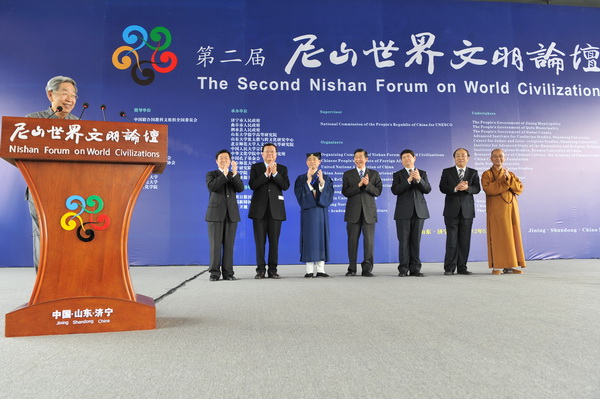 |
|
[Photo/nishan.org]
|
"When friends come from afar, isn't it a delight?" said Confucius some 2,500 years ago. If the great thinker were still alive today, he would have been delighted to see that people from across the world have gathered in his hometown, discussing the value of Confucianism while exploring the path toward a harmonious world.
The Third Nishan Forum on World Civilizations was held in Ji-nan in Shandong province over three days last week. The conference, with a theme of "common human ethics amid different beliefs," attracted some 130 experts and academics on philosophy, theology, religious and cultural studies from different cultural backgrounds.
Participants agreed that the wisdom of traditional Chinese culture, especially the teachings of Confucius, can greatly contribute to problem-solving in modern times.
Xu Jialu, president of the organizing committee, says the root cause of the crisis shared by human beings nowadays is the distortion of moral values and overlooking of the importance of ethics.
It is of primary importance to establish a new common set of ethics for mankind which is based on such values as equality, respect, friendliness and common prosperity, he says.
Xu, the retired vice-chairman of the Standing Committee of the National People's Congress and a renowned Confucian scholar, says Confucian cosmic views of unity with nature, social views of harmony in diversity, and values of taking benevolence as one's own responsibility conform to the laws of nature and development of humankind.
Fred Dallmayr, a US professor from the University of Notre Dame and co-chair of the World Public Forum, says that since the Renaissance, there has been a tendency in the West to emphasize individualism.
Meanwhile, in Confucian teaching, there is no isolated being, and people live in all kinds of relationships. This sense of interaction can foster the merits of tolerance, generosity and respect, which can help people overcome their hostility toward others, Dallmayr suggests.
The view is echoed by Roger T. Ames, a professor at the University of Hawaii who has translated ancient Chinese classics including The Analects and The Art of War into English.
"All the problems we have today including climate change, pandemics, and population explosion are problems without boundaries which cannot be solved singlehandedly," he says, urging different countries to address the issues together.
We Recommend:
